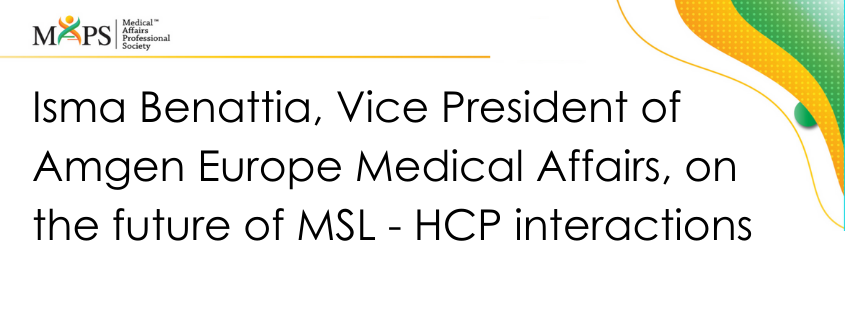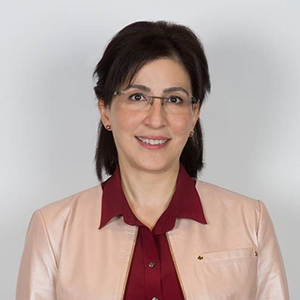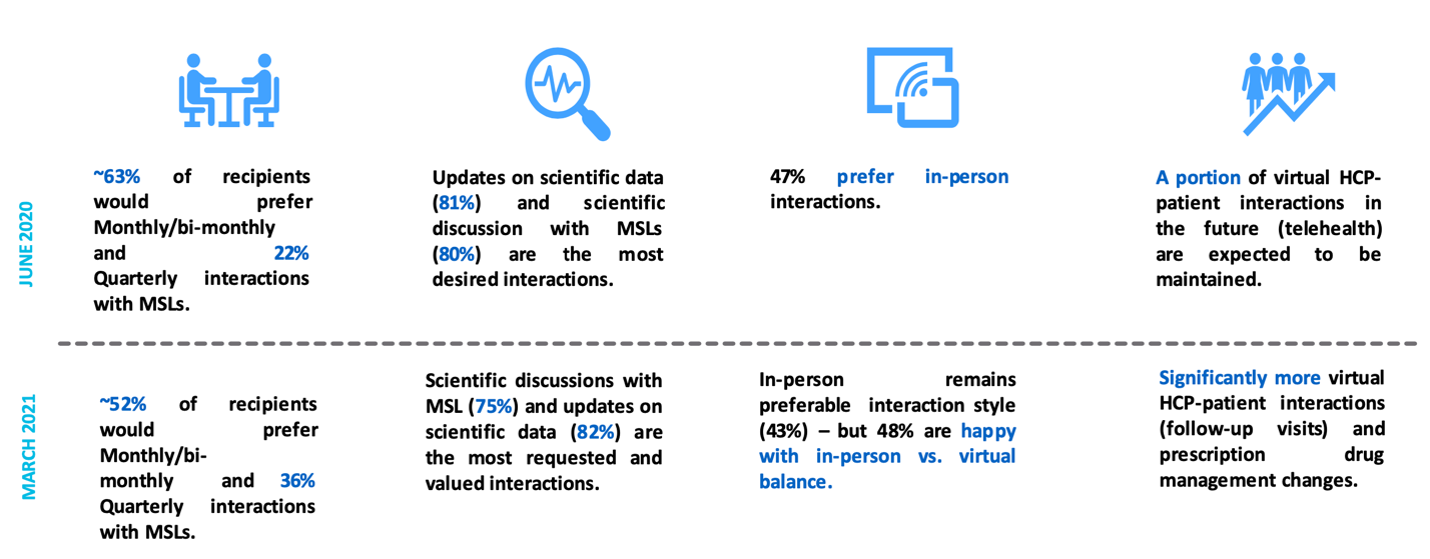Connect with Us
602 Park Point Drive, Suite 225, Golden, CO 80401 – +1 303.495.2073
© 2025 Medical Affairs Professional Society (MAPS). All Rights Reserved Worldwide.

In September 2020, MAPS published an article with Isma Benattia, Vice President of Amgen Europe Medical Affairs, describing results of a survey detailing Healthcare provider (HCP) preferences for interactions with Medical Science Liaisons (MSLs) in light of COVID-19.
In March 2021, approximately a year after the beginning of the worldwide spread of the pandemic, Amgen Europe repeated this survey with the same group of participants. The table below shows changes in key measures between the two.
Here the Medical Affairs Professional Society (MAPS) speaks with Isma about these surveys and wider changes in the way MSLs will work with their HCP peers as we emerge from the pandemic.

Vice President of Amgen Europe Medical Affairs

MAPS: First, can you give us some background on the purpose of this survey?
Isma: At Amgen, our mission is to Serve Patients. To do this, we aim to understand what the people taking care of the patients – Healthcare Professionals – need and how can we support them.
The pandemic brought significant changes in the way we go about our lives – how we work, how we manage our time, just to name a few. As humans, our survival instinct helps us adapt quickly, but we can also revert back to our established routines just as rapidly. The duration of this pandemic is forcing us to reconsider how we interact with each other long term. This is also true for HCPs, patients and the healthcare industry.
MAPS: And what does this most recent survey tell us about HCP preferences for these interactions?
Isma: What we’ve learned is that HCPs still value fact-to-face (FTF) interactions (it’s human nature), and they want to believe things can go back to normal. So, we see that FTF will remain an important part of how Medical Affairs will interact with HCPs – not just the way MSLs reach HCPs, but how other Medical functions work with their stakeholders as well. Through our second survey, we also see an important “message” from HCPs: the future is hybrid. Independent of specialty, HCPs favor a hybrid model that combines FTF and digital. The challenge is to find the right ratio of this combination: Is it 50/50, 40/60? Can we personalize this ratio and the ways we reach HCPs based on individual preferences? Should we engage some HCPs (so called digital OLs) as a separate sub-group entirely through digital means?
MAPS: What about the content of these interactions?
Isma: For me the Aha moment of this survey was confirming that physicians are seeing MSLs as a reliable, trusted source for them to receive the latest scientific data. That was very consistent and robust.
Every day we receive a large amount of information to a point we can’t process it anymore, so it’s wonderful to have someone to meet with you and point to the important parts. That is the value of Medical: trusted, balanced scientific information sharing.
MAPS: It was interesting to see changes in HCP preferences from early summer when most of the world felt very much in the grip of the pandemic, to spring of 2021 when it seems like we are getting ready to emerge from the pandemic’s worst effects. Can you tell us about some of these differences?
Isma: HCPs want less interactions (as the demand on their time is increasing), but if there is one, they want to get the most out of it: quality over quantity. In the beginning of the pandemic, they were more isolated (efforts were focused on COVID-19 patients), so needed that type of interaction. Now they are adjusting to their new normal like the rest of us and there is a high demand for their time, in some cases even a backlog of providing delayed care to patients. We will continue to see other normalizations and adjustments. It will be interesting to run another survey after vaccination campaigns across countries progress.
MAPS: Did you see more broad changes, even beyond the MSL/HCP interaction?
Isma: One should not just look at Medical Affairs through a single lens of MSL – HCP interactions, but rather consider the whole ecosystem. For example, during this period, telehealth started to be more accessible and physicians started to get more engaged with managing patients remotely. Also, health authorities have decided to encourage telehealth by facilitating reimbursement of remote visits. Some patients and HCPs are adapting rapidly while others are still struggling with this concept. There is a need for further education on this new way of practicing medicine.
MAPS: Do you see opportunities for Medical to provide value in this adjusted ecosystem?
Isma: When we saw this shift toward increased use of telehealth, we also heard from our HCPs that practicing medicine through a screen is very different than face-to-face. And what we realized – and what we often tend to forget – is how physicians react to changes like this. Sometimes they require help in understanding the cognitive and behavior changes patients go through when using telehealth versus in-person. At Amgen Europe Medical, we offered unique educational sessions with an expert in Cognitive Behavior principals. The training has received very positive feedback from physicians, most of them outlining the need for such a training in helping them understand their patients better upon a delivery of a life-changing diagnosis.
The pandemic forced us to change the norms of interactions and an MA organization needs to be sensitive to understanding these needs. We saw an opportunity in providing sessions to help physicians with a very immediate challenge, even outside the context of a specific drug or therapy area. If you want to serve patients, you need to understand the needs of the HCPs.
MAPS: It sounds like this disrupted ecosystem is ripe for innovation…
Isma: It is ready, without a doubt. We talk a lot about HCP engagement and education. However, there’s not enough effort made to engage and educate patients; this is not about creating a new document or another booklet. We should use digital tools for engaging and to educating patients in a digital era and leverage other key learnings of COVID-19. It requires agility, willingness to innovate and high ethical, as well as quality standards.
602 Park Point Drive, Suite 225, Golden, CO 80401 – +1 303.495.2073
© 2025 Medical Affairs Professional Society (MAPS). All Rights Reserved Worldwide.

 Partnering for Today and Tomorrow – Episode 11 Clinical Operations
Partnering for Today and Tomorrow – Episode 11 Clinical Operations